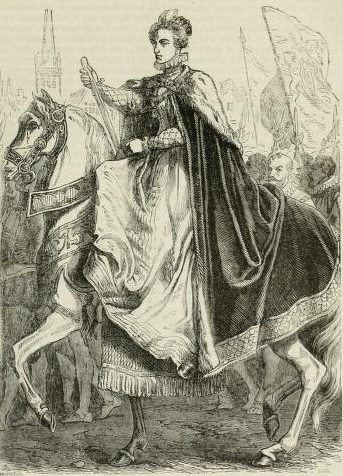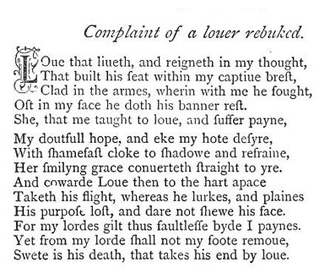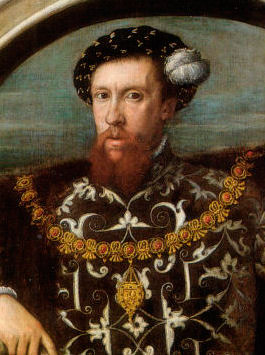A Valediction: Forbidding Mourning
As virtuous men pass mildly away,
And whisper to their souls to go,
Whilst some of their sad friends do say
The breath goes now, and some say, No:
So let us melt, and make no noise,
No tear-floods, nor sigh-tempests move;
'Twere profanation of our joys
To tell the laity our love.
Moving of th' earth brings harms and fears,
Men reckon what it did, and meant;
But trepidation of the spheres,
Though greater far, is innocent.
Dull sublunary lovers' love
(Whose soul is sense) cannot admit
Absence, because it doth remove
Those things which elemented it.
But we by a love so much refined,
That our selves know not what it is,
Inter-assured of the mind,
Care less, eyes, lips, and hands to miss.
Our two souls therefore, which are one,
Though I must go, endure not yet
A breach, but an expansion,
Like gold to airy thinness beat.
If they be two, they are two so
As stiff twin compasses are two;
Thy soul, the fixed foot, makes no show
To move, but doth, if the other do.
And though it in the center sit,
Yet when the other far doth roam,
It leans and hearkens after it,
And grows erect, as that comes home.
Such wilt thou be to me, who must,
Like th' other foot, obliquely run;
Thy firmness makes my circle just,
And makes me end where I begun.
John Donne: Poems Summary and Analysis of "A Valediction: Forbidding Mourning"
The poet begins by comparing the love between his beloved and himself with the passing away of virtuous men. Such men expire so peacefully that their friends cannot determine when they are truly dead. Likewise, his beloved should let the two of them depart in peace, not revealing their love to “the laity.”
Earthquakes bring harm and fear about the meaning of the rupture, but such fears should not affect his beloved because of the firm nature of their love. Other lovers become fearful when distance separates them—a much greater distance than the cracks in the earth after a quake—since for them, love is based on the physical presence or attractiveness of each other. Yet for the poet and his beloved, such a split is “innocent,” like the movements of the heavenly spheres, because their love transcends mere physicality.
Indeed, the separation merely adds to the distance covered by their love, like a sheet of gold, hammered so thin that it covers a huge area and gilds so much more than a love concentrated in one place ever could.
He begins by stating that the virtuous man leaves life behind so delicately that even his friends cannot clearly tell the difference. Likewise, Donne forbids his wife from openly mourning the separation. For one thing, it is no real separation, like the difference between a breath and the absence of a breath. For another thing, mourning openly would be a profanation of their love, as the spiritual mystery of a sacrament can be diminished by revealing the details to “the laity” (line 8). Their love is sacred, so the depth of meaning in his wife’s tears would not be understood by those outside their marriage bond, who do not love so deeply. When Donne departs, observers should see no sign from Donne’s wife to suggest whether Donne is near or far because she will be so steadfast in her love for him and will go about her business all the same.
The third stanza suggests that the separation is like the innocent movement of the heavenly spheres, many of which revolve around the center. These huge movements, as the planets come nearer to and go farther from one another, are innocent and do not portend evil. How much less, then, would Donne’s absence portend. All of this is unlike the worldly fear that people have after an earthquake, trying to determine what the motions and cleavages mean.
In the fourth and fifth stanzas, Donne also compares their love to that of “sublunary” (earth-bound) lovers and finds the latter wanting. The love of others originates from physical proximity, where they can see each other’s attractiveness. When distance intervenes, their love wanes, but this is not so for Donne and his beloved, whose spiritual love, assured in each one’s “mind,” cannot be reduced by physical distance like the love of those who focus on “lips, and hands.”
The use of “refined” in the fifth stanza gives Donne a chance to use a metaphor involving gold, a precious metal that is refined through fire. In the sixth stanza, the separation is portrayed as actually a bonus because it extends the territory of their love, like gold being hammered into “aery thinness” without breaking (line 24). It thus can gild that much more territory.
The final three stanzas use an extended metaphor in which Donne compares the two individuals in the marriage to the two legs of a compass: though they each have their own purpose, they are inextricably linked at the joint or pivot at the top—that is, in their spiritual unity in God. Down on the paper—the earthly realm—one leg stays firm, just as Donne’s wife will remain steadfast in her love at home. Meanwhile the other leg describes a perfect circle around this unmoving center, so long as the center leg stays firmly grounded and does not stray. She will always lean in his direction, just like the center leg of the compass. So long as she does not stray, “Thy firmness makes my circle just, / And makes me end where I begun,” back at home (lines 35-36). They are a team, and so long as she is true to him, he will be able to return to exactly the point where they left off before his journey.








